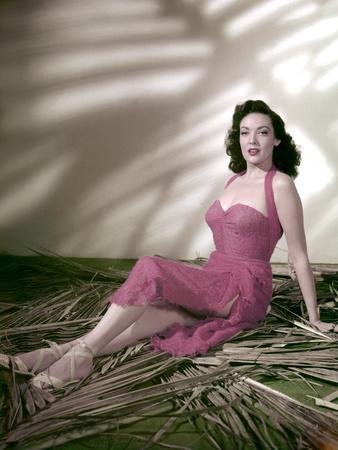Before Morticia Addams had her signature smirk, before gothic glamor became a trend, and before Hollywood figured out how to handle women who were both strong and stunning — there was Yvonne De Carlo.
To many, she’s best remembered as Lily Munster, the elegant matriarch in The Munsters. But to stop there would be to miss the remarkable arc of a woman who went from Technicolor temptress to television legend — all while navigating the whims of a fickle industry and carving out a legacy that still haunts Hollywood in the best way.
The Exotic Label That Almost Defined Her
Born Margaret Yvonne Middleton in Vancouver in 1922, Yvonne De Carlo didn’t grow up among stars. She was raised by a single mother, who saw something in her daughter — a drive, a beauty, a spark — and moved them to Los Angeles to chase a dream.
Early Hollywood didn’t quite know what to do with her. Studios loved her dark hair, striking cheekbones, and wide-set eyes, but rather than offer her nuanced roles, they typecast her in “exotic” parts — princesses, desert girls, mysterious foreigners. She became known as the Queen of Technicolor, thanks to her string of visually dazzling but shallow roles in the 1940s and early ’50s.
But Yvonne wasn’t just a pretty face. She could sing. She could dance. She had comic timing, dramatic depth, and a fierce work ethic. Slowly, she began to demand more than eye-candy status — and in 1956, she got it.

From Starlet to Star: The Ten Commandments
When director Cecil B. DeMille cast her as Sephora, the wife of Moses, in The Ten Commandments, it changed everything. The epic biblical drama gave Yvonne De Carlo her first truly substantial role — and she delivered. As Charlton Heston’s serene, loyal wife, she showed audiences she could do gravitas just as easily as glamour.
The film was a global hit. Suddenly, De Carlo wasn’t just a B-movie beauty. She was a bona fide star.
But Hollywood, as always, had its limits. By the early 1960s, as new waves of actresses emerged and older stars found fewer roles, Yvonne was once again in career limbo — until a strange little sitcom came calling.

Lily Munster: The Gothic Matriarch Who Made Her Immortal
When The Munsters premiered in 1964, few expected it to last. A black-and-white comedy about a family of monsters? It sounded like a novelty act. But what audiences found was something unexpectedly warm, clever — and anchored by the elegant and deadpan brilliance of Yvonne De Carlo.
As Lily Munster, she was part vampire, part sitcom mom, and completely original. Dressed in floor-length gowns, with her signature shock of white hair, Lily was spooky, stylish, and maternal — a far cry from the “exotic seductress” roles of Yvonne’s past.
Critics praised her comedic chops. Kids adored her. And overnight, she became a cult icon.
De Carlo herself called The Munsters a “lifeline.” After years of struggling financially (and raising two sons after the tragic death of her husband, stuntman Bob Morgan), the steady TV paycheck gave her stability — and a second act that generations would never forget.

Off-Screen Strength, On-Screen Legend
Behind the scenes, De Carlo’s life was filled with both triumphs and heartbreak. Her marriage was tumultuous. Her husband was seriously injured during a stunt gone wrong. She shouldered family burdens, fought studio politics, and battled typecasting — but she kept working.
Later in her career, she appeared in stage musicals (Follies on Broadway), made-for-TV movies, and guest appearances. Even when roles slowed, her legacy endured. Young goths, classic film lovers, and horror fans alike rediscovered her charm, her power, and that perfect balance of camp and class.

The Legacy of Yvonne De Carlo
Yvonne De Carlo passed away in 2007 at the age of 84. But her influence lives on — not just in reruns of The Munsters, but in every strong, stylish woman who refuses to be boxed in by stereotypes.
She was more than a pin-up. More than Lily Munster. She was an actress who reinvented herself, who refused to fade quietly, and who brought elegance to every genre she touched — from biblical epics to black-and-white comedy.
In the end, Yvonne De Carlo wasn’t just a product of her era. She was a woman ahead of her time.


